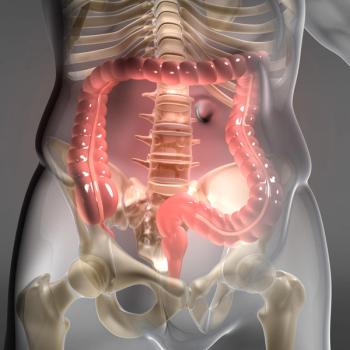
Colorectal Cancer
Latest News
Latest Videos

Podcasts
CME Content
More News

Patients with peritoneal metastases were historically associated with limited survival and low consideration for clinical trials.

Muhammad Talha Waheed, MD, stated that a retrospective study found an OS benefit in CRC peritoneal metastasis with cytoreduction surgery without HIPEC vs with HIPEC.

Laparoscopic, histologic, and biomarker responses occurred at all dose levels of mitomycin treatment in patients with peritoneal metastases.

Sirexatamab plus bevacizumab/chemotherapy significantly improved overall response rate in patients with high DKK1 levels in the phase 2 DeFianCe study.

Antitumor efficacy end points favored placebo over trilaciclib prior to FOLFOXIRI/bevacizumab in patients with untreated metastatic colorectal cancer.

In a small cohort of patients with MMS/pMMR CRC, the suvemcitug and envafolimab pharmacokinetic profiles were comparable with prior monotherapy studies.

Phase 3 CheckMate-8HW trial results evaluating the combination in microsatellite instability–high or mismatch repair deficient CRC supported the decision.

The approval of sotorasib plus panitumumab is a “welcome step” in KRAS G12C-mutated colorectal cancer, according to Marwan G. Fakih, MD.

Efficacy results demonstrated by regorafenib and sintilimab in patients with mSS mCRC were dependent on patient characteristics such location of metastasis and RAS type.

Combining sotorasib with panitumumab may reduce the burden of disease in patients with KRAS G12C-mutated metastatic colorectal cancer.

Findings from the CodeBreak 300 study have cemented sotorasib/panitumumab as a third-line treatment option for KRAS G12C-mutated colorectal cancer.

Adding panitumumab to sotorasib has yielded higher responses rates in KRAS G12C-mutated CRC compared with prior standards of care.

Sotorasib plus panitumumab may offer improved survival compared with previously approved treatment options in KRAS G12C-mutated colorectal cancer.

Additional local, regional, or national policy may bolster access to screening for colorectal cancer, according to Aasma Shaukat, MD, MPH.

Full progression-free survival results for patients with BRAF V600E mCRC from the phase 3 BREAKWATER trial will be presented at an upcoming medical conference.

There were fewer adverse effects and no treatment-related deaths associated with thermal ablation vs surgical resection for patients with colorectal liver metastases.

“It does appear like MET expression could be one of the mechanisms wherein you could differentiate between responders and non-responders,” Kanwal P.S. Raghav, MBBS, MD, stated.

Results from a phase 2 trial revealed serplulimab plus HLX04 elicited promising antitumor activity in patients with advanced hepatocellular carcinoma.

Additional progression-free survival data from the phase 3 BREAKWATER trial will be presented at future meetings.

The major pathologic response rate improved with extended time to surgery using botensilimab plus balstilimab in resectable colorectal cancer.

At a longer follow-up, adagrasib with cetuximab maintained meaningful efficacy and elicited an ORR of 34%, results from the phase 1/2 KRYSTAL-1 showed.

Phase 2 data may support fruquintinib plus TAS-102 as an alternative third-line treatment in patients with metastatic colorectal cancer.

The ALASCCA trial found that the risk of disease recurrence was reduced by 51% for patients with PIK3CA-mutated colorectal cancer who took aspirin for 3 years.

The BREAKWATER trial found that encorafenib and cetuximab with mFOLFOX6 chemotherapy generated an ORR of 60.9% in BRAF V600E–mutated metastatic colorectal cancer.

Post-operative ctDNA testing led to a change in adjuvant management in 1 of 6 patients with stage II/III colorectal cancer treated in the BESPOKE trial.
















































